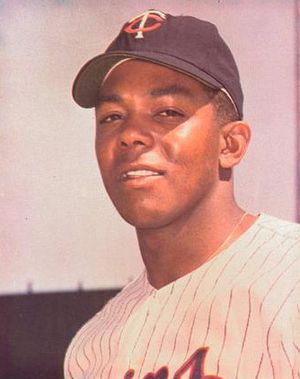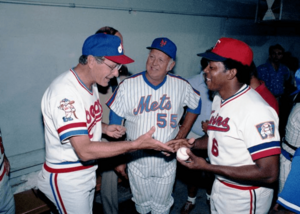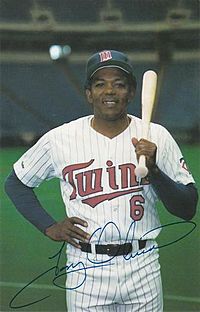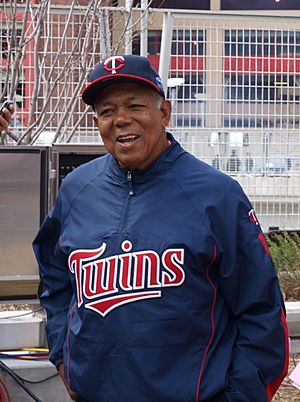Tony Oliva facts for kids
Quick facts for kids Tony Oliva |
|||
|---|---|---|---|

Oliva with the Minnesota Twins in 1965
|
|||
| Right fielder / Designated hitter | |||
| Born: July 20, 1938 Pinar del Río, Cuba |
|||
|
|||
| debut | |||
| September 9, 1962, for the Minnesota Twins | |||
| Last appearance | |||
| September 29, 1976, for the Minnesota Twins | |||
| MLB statistics | |||
| Batting average | .304 | ||
| Home runs | 220 | ||
| Runs batted in | 947 | ||
| Teams | |||
|
|||
| Career highlights and awards | |||
|
|||
| Induction | 2022 | ||
| Vote | 75% | ||
| Election Method | Golden Days Era Committee | ||
Tony Pedro Oliva Lopez (born July 20, 1938) is a Cuban former professional baseball player and coach. He played his entire career in Major League Baseball (MLB) for the Minnesota Twins. Tony was a right fielder and later a designated hitter from 1962 to 1976.
He was an eight-time All-Star player. Tony was a key part of the Twins teams that won the American League pennant in 1965. They also won two American League Western Division titles in 1969 and 1970.
Tony Oliva was named the American League (AL) Rookie of the Year in 1964. He won three American League batting championships. He also earned a Gold Glove Award during his career. Tony was one of the best hitters in baseball for his first eight seasons.
After eight seasons, Tony's career was affected by serious knee injuries. This made him become a designated hitter for his last four years. He finished his career with a .304 batting average. Tony was inducted into the Minnesota Sports Hall of Fame in 1988. He also joined the Minnesota Twins Hall of Fame in 2000. The Twins retired his uniform number 6 in 1991. In 2022, he was inducted into the Baseball Hall of Fame.
Contents
Early Life and Baseball Dreams
Tony Oliva was born in Pinar del Río Province, Cuba, in 1938. He played baseball every week with his family and friends. They played in an empty field near his family's farm. Tony's father worked in a tobacco factory. He was also a former semi-professional baseball player. He taught Tony how to hit and helped him become a great hitter.
A scout for the Minnesota Twins noticed Tony's talent. The scout brought him to the United States to play professionally. Tony didn't want to leave his parents and nine brothers and sisters. But his father encouraged him to go to America. He told Tony to become "rich and famous."
Tony's Professional Baseball Journey
Starting in the Minor Leagues
Tony Oliva arrived in the U.S. in the spring of 1961. During spring training, he played in the Twins' last three games. He got seven hits in ten at bats. However, the Twins had already filled their minor league teams. They let Tony go, some said because of his outfield play.
Tony had nowhere to go. So, he went to Charlotte, North Carolina. He trained with a friend who played for a Twins Class A team. Tony's quick bat speed and strong hitting impressed the Charlotte general manager. He convinced the Twins to sign Tony again.
When Tony first arrived in the U.S., his paperwork was changed. It showed the name and birthdate of his younger brother, Pedro Jr. This made him seem younger to scouts. The name "Tony Pedro Oliva" stuck, and he officially changed his name later.
The Twins sent Tony to the Class-D Wytheville Twins. He played 64 games there. He led the league with a .410 batting average. After playing well in winter ball, Tony went to single-A Charlotte. He hit .350 with 17 home runs and 93 RBIs in 127 games. He was called up to the major leagues for the last nine games of 1962. He hit an amazing .444 in 12 times at bat.
In 1963, Tony was invited to spring training with the Twins. The team hoped his left-handed hitting would balance their right-handed sluggers. He became friends with teammate Zoilo Versalles. Zoilo believed Tony was "the new Ty Cobb" because of his hitting and speed. But Tony didn't make the Twins' main team. He was sent to the Class AAA Dallas-Fort Worth Rangers. He started slow but finished the minor league season strong. He had a .304 batting average, 23 home runs, and 74 RBIs. This earned him another call-up to the Twins for the end of the 1963 season. He hit .429 in 7 at-bats.
Becoming a Major League Star
Tony Oliva was almost everyone's choice for the 1964 American League (AL) Rookie of the Year. He got 19 out of 20 first-place votes. Tony was also chosen for his first All-Star game in his rookie year. His AL-leading .323 batting average made him the first player ever to win both Rookie of the Year and the AL batting title. He also led the AL in hits (217), doubles (43), and total bases (374). Tony finished fourth in the MVP voting.
In 1965, Tony won his second straight AL batting title with a .321 average. This was another first in baseball history. His hitting was even more impressive because it was during a time when hitting was difficult. Only two other AL hitters reached the .300 mark that season. Tony also had 16 home runs, 98 runs batted in, and 107 runs. He led the AL in hits (185) and batting average (.321). He finished second in the MVP voting to his teammate, Zoilo Versalles.
In 1966, Tony was leading the league with a .328 average by the end of July. He had some tough hitting slumps later in the season. This cost him a chance at his third straight batting title. Tony finished with a .307 batting average. He was second to Triple Crown winner Frank Robinson, who hit .316. For the third year in a row, Tony led the AL in hits (191). He also won his only Gold Glove Award.
One of the season's most exciting moments happened on June 9, 1966. In a game against the Kansas City Athletics, Tony joined four teammates to hit five home runs in one inning. This tied an MLB record for the most home runs in a single inning.
After a slightly less strong year in 1967, Tony's 1968 season was cut short by injury. He missed the last 34 games. He still hit .289, which was good for third in the AL. He returned strong in 1969, again placing third in the AL with a .309 batting average. He had 24 homers, 101 RBIs, and led the league in hits (197) and doubles (39). In 1970, he finished third in batting average at .325, with 23 home runs and 107 RBIs. He led the AL in hits (204) for the fifth time and in doubles (36) for the fourth time. He finished second in MVP voting again.
In 1971, Tony won his third AL batting title with a .337 average. He also led the league in slugging percentage (.546). These achievements marked the peak of his career. After this, severe knee, leg, and shoulder injuries started to affect his playing days. His roommate, Rod Carew, often heard Tony "moaning and groaning" from his sore knees.
Tony played only 10 games in 1972 before having surgery. Because of his injuries and a new rule in 1973, he became the Twins' designated hitter. He stayed in that role for his final four seasons. Tony hit the first home run by a DH in league play on April 6, 1973. Just three months later, he became the first DH to hit 3 home runs in a single game.
After retiring as a player, Tony became a coach for the Twins. He is the only person to be on the field with all three Minnesota Twins' World Series teams. He was a star outfielder in 1965, a hitting coach in 1987, and a bench coach in 1991.
Tony Oliva's MLB Statistics
| Years | Games | AB | Runs | Hits | 2B | 3B | HR | RBI | SB | CS | BB | SO | AVG | OBP | SLG | OPS | E | FLD% |
|---|---|---|---|---|---|---|---|---|---|---|---|---|---|---|---|---|---|---|
| 15 | 1,676 | 6,301 | 870 | 1,917 | 329 | 48 | 220 | 947 | 86 | 55 | 448 | 645 | .304 | .353 | .476 | .830 | 61 | .975 |
Awards and Honors
 |
|
| Tony Oliva's number 6 was retired by the Minnesota Twins in 1991. |
Tony Oliva received many awards and honors during his career:
| Award / Honor | Time(s) | Date(s) |
|---|---|---|
| American League Rookie of the Year | 1 | 1964 |
| American League All-Star | 8 | 1964–1971 |
| American League Gold Glove Award (OF) | 1 | 1966 |
| American League Player of the Week | 1 | June 30, 1974 |
Tony was also the AL MVP runner-up in 1965 and 1970. He was inducted into the National Baseball Hall of Fame in 2022.
Other achievements:
- World Series champion: 1987, 1991 (as a coach)
- AL batting champion: 1964, 1965, 1971
- AL leader in slugging average: 1971
- AL leader in runs scored, total bases, runs created, and extra base hits: 1964
- AL leader in hits: 1964–1966, 1969, 1970
- AL leader in doubles: 1964, 1967, 1969, 1970
- AL leader in sacrifice flies: 1965
- AL leader in put outs as right fielder: 1964–1967, 1969, 1970
- AL leader in assists as right fielder: 1969, 1970
- AL leader in double plays turned as right fielder: 1966, 1970, 1971
- Minnesota Twins No. 6 retired: July 14, 1991.
- Minnesota Twins Hall of Fame: 2000
- Tony Oliva statue, Target Field: April 8, 2011.
Hall of Fame Journey
Tony Oliva was considered for the National Baseball Hall of Fame by baseball writers from 1982 to 1996. Many people, including fellow Hall of Famer Tony Pérez, believed Tony deserved to be in the Hall of Fame.
He was considered several times by different committees. In 2011, he was very close to being voted in, missing by only four votes. In 2014, he was just one vote short.
Golden Days Committee Vote
Finally, on December 5, 2021, the Golden Days Committee voted Tony Oliva into the Hall of Fame. He was officially honored on July 24, 2022.
Tony Oliva's Legacy

Throughout his 15-year career, Tony Oliva was known for his positive attitude. He was popular with fans and the media in the Twin Cities. They even gave him the nickname "Tony-O."
Tony had amazing hitting numbers during a time when pitchers often dominated the game. He batted .304 with 220 home runs, 947 RBIs, and 1,917 hits. He was chosen for the All-Star team for his first eight seasons. This broke Joe DiMaggio's record of six selections. Tony was also a great defensive outfielder with a strong arm. He led AL right fielders in putouts six times.
As a pinch hitter, Tony was very effective. He hit .340 with 2 home runs and 27 RBIs in that role. Many famous pitchers, like Catfish Hunter and Dean Chance, said Tony Oliva was the toughest hitter they ever faced. They said he could hit any pitch anywhere.
Personal Life
Tony Oliva started dating Gordette DuBois in the mid-1960s. They got married in Hitchcock, South Dakota, in 1968. They made their home in Bloomington, Minnesota. Tony still lives in the house he bought in 1972. All four of his children live close by. As of 2015, Tony also had four grandchildren.
See also
- Major League Baseball titles leaders
- List of Gold Glove Award winners at outfield
- List of Major League Baseball annual doubles leaders
- List of Major League Baseball annual runs scored leaders
- List of Major League Baseball batting champions
- List of Major League Baseball career games played as a right fielder leaders
- List of Major League Baseball career putouts as a right fielder leaders
- List of Major League Baseball hit records
- List of Major League Baseball players from Cuba
- List of Major League Baseball players who spent their entire career with one franchise
 | Isaac Myers |
 | D. Hamilton Jackson |
 | A. Philip Randolph |



